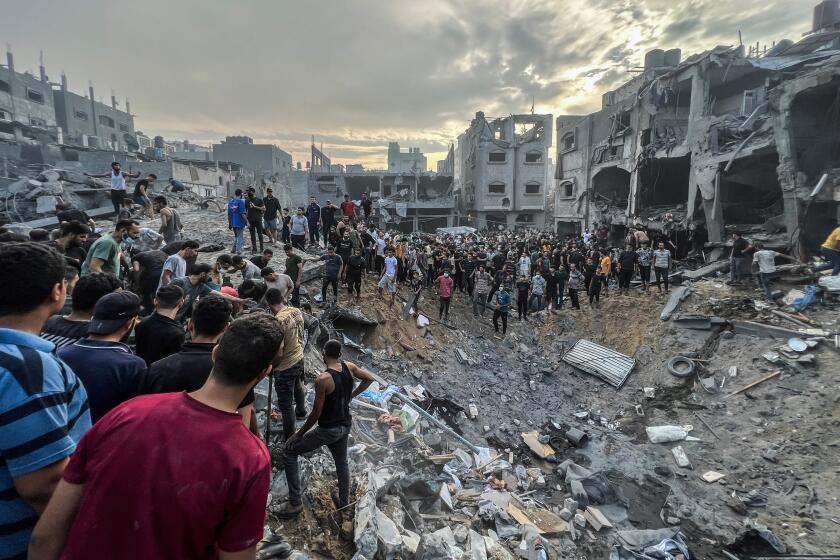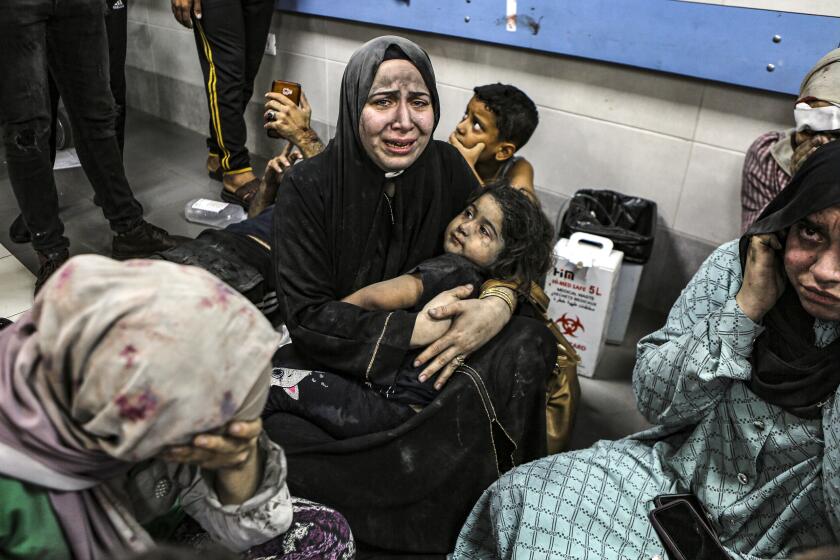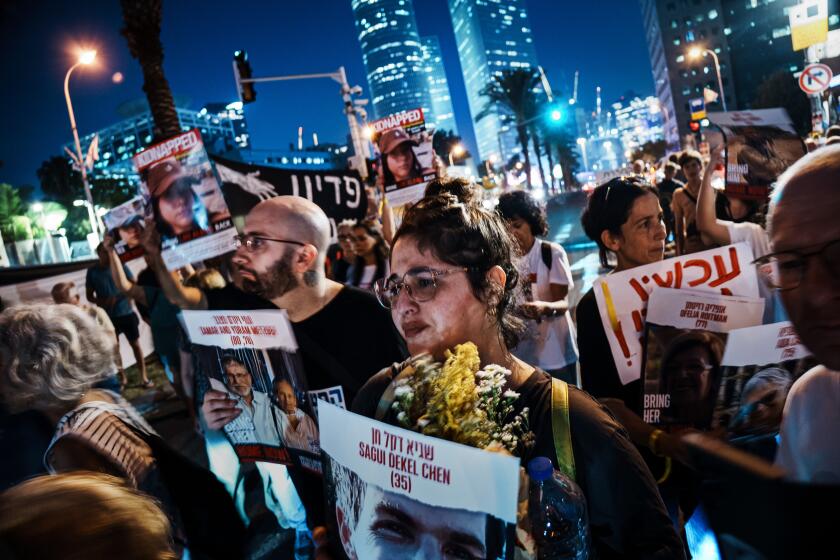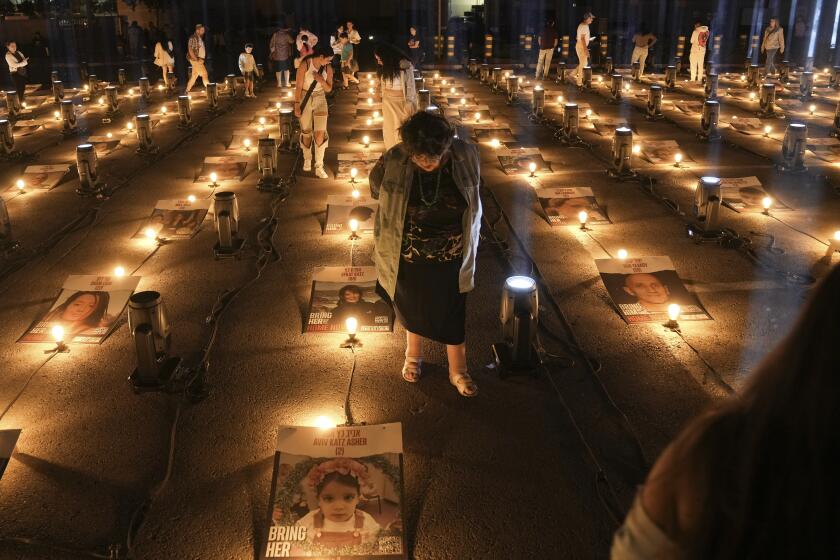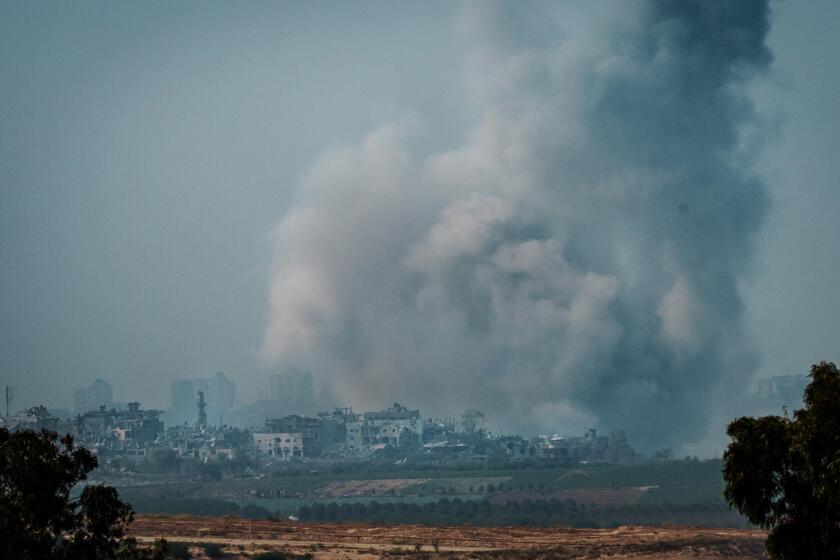U.S. and Arab partners disagree on the need for a cease-fire as Israeli airstrikes kill more civilians
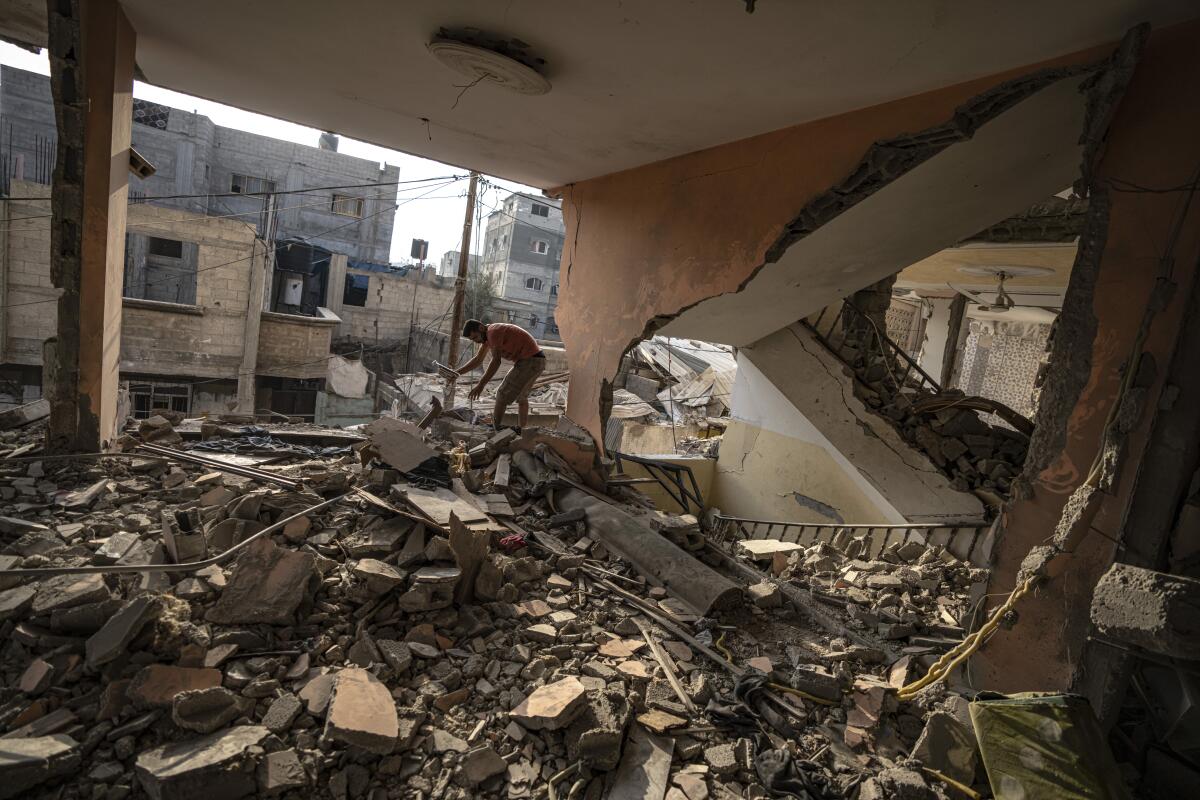
RAFAH, Gaza Strip — United States and Arab partners disagreed Saturday on the need for an immediate cease-fire in the Gaza Strip as Israeli military strikes killed civilians at a U.N. shelter and a hospital in a growing assault on the besieged enclave’s Hamas leaders.
Large columns of smoke rose as Israel’s military said it had encircled Gaza City, the target of its offensive to crush Hamas, which attacked civilians in towns, on kibbutzes and at a music festival in southern Israel on Oct. 7, killing more than 1,400 people and taking more than 200 hostages. The Gaza Health Ministry has said more that than 9,400 Palestinians have since been killed in the territory, and that number is likely to rise as the Israeli assault continues.
“Anyone in Gaza City is risking their life,” said Yoav Gallant, Israel’s minister of defense, adding that Hamas fighters were “encountering the full force” of Israeli troops.
U.S. Secretary of State Antony J. Blinken met on Saturday with Arab foreign ministers in Jordan a day after talks in Israel with Prime Minister Benjamin Netanyahu, who insisted there could be no temporary cease-fire until all hostages held by Hamas are released.
Jordan’s foreign minister, Ayman Safadi, said Arab countries seek an immediate cease-fire. “The whole region is sinking in a sea of hatred that will define generations to come,” Safadi said.
Blinken, however, said, “It is our view now that a cease-fire would simply leave Hamas in place, able to regroup and repeat what it did on Oct. 7.” He said the U.S. believes that humanitarian pauses can be a “critical mechanism in protecting civilians, in getting aid in and getting foreign nationals out, while still enabling Israel to achieve its objective, the defeat of Hamas.”
Egyptian officials said they and Qatar were proposing humanitarian pauses for six to 12 hours daily to allow aid in and casualties to be evacuated. They also were asking for Israel to release a number of women and elderly prisoners in exchange for hostages held by Hamas, suggestions Israel seems unlikely to accept. They spoke on condition of anonymity because they were not authorized to brief the press on the discussions.
Israel has repeatedly demanded that northern Gaza’s 1.1 million residents flee south, and on Saturday it offered a three-hour window for residents to do so. An AP journalist on the road, however, saw nobody coming. The head of the government media office in Gaza, Salama Maarouf, said no one went south because the Israeli military had damaged the road.
But Israel asserted that Hamas “exploited” the window to move south and attack its forces. There was no immediate Hamas comment on that claim, which was impossible to verify.
Some Palestinians said they didn’t flee because they feared Israeli bombardment.
“We don’t trust them,” said Mohamed Abed, who sheltered with his wife and children on the grounds of Shifa hospital, one of thousands of Palestinians seeking safety at medical centers in the north.
Airstrikes flatten blocks of Gaza refugee camp, bringing rage, grief and a perilous new phase of war
Israel’s military says it killed a Hamas commander in devastating strikes in Jabaliya refugee camp in Gaza. Hospital chief describes ‘waterfall of casualties.’
Swaths of residential neighborhoods in northern Gaza have been leveled in airstrikes. U.N. monitors say more than half of northern Gaza’s remaining residents, estimated at around 300,000, are sheltering in U.N.-run facilities. But deadly Israeli strikes have repeatedly hit and damaged those shelters. The U.N. agency for Palestinian refugees has said it has lost contact with many in the north.
On Saturday, two strikes hit a U.N. school-turned-shelter just north of Gaza City, killing several people in tents in the schoolyard and women who were baking bread inside the building, according to the U.N. agency for Palestinian refugees.
Initial reports indicated that 20 people were killed, said spokeswoman Juliette Touma.
The Health Ministry in Hamas-run Gaza reported that 15 people were killed at the school where thousands have sought shelter, and another 70 people wounded.
Also Saturday, two people were killed in a strike by the gate of Nasser Hospital in Gaza City, according to Medhat Abbas, spokesman for the Health Ministry. And a strike hit near the entrance to the emergency ward of Al-Quds Hospital in Gaza City, injuring at least 21, the Palestinian Red Crescent said.
The World Health Organization on Saturday called attacks on healthcare facilities in Gaza “unacceptable.”
Israel and the Palestinian militant group Hamas appear set to go head-to-head on the ground in Gaza. What’s each side’s endgame?
About 1.5 million people in Gaza, or 70% of the population, have fled their homes, according to the U.N.
With food, water and the fuel needed for generators that power hospitals and other facilities running out, U.N. Secretary-General António Guterres urged an immediate cease-fire to allow aid in.
Israel-Hamas war: In a national vigil of sorts, Israelis hope for the return of more than 220 people seized by militants and believed held in Gaza.
“The humanitarian situation in Gaza is horrific,” Guterres said late Friday in an unusually blunt statement. “An entire population is traumatized, nowhere is safe.”
Guterres said he had not forgotten the slaughter of civilians in Israel at the hands of Hamas militants when they launched their initial attack almost a month ago, but said civilians and civilian infrastructure in Gaza must be protected. He also said civilians must not be used as human shields, and called upon Hamas to release all of the roughly 240 hostages it is holding.
Weeks after Hamas militants paraded her nearly naked body, young Israeli festival-goer Shani Louk is confirmed dead. Many families still await news of their loved ones.
The family home of Hamas’ exiled leader Ismail Haniyeh, in the Shati refugee camp on the northern edge of Gaza City, was hit Saturday morning by an airstrike, according to the Hamas-run media office in Gaza. It had no immediate details on damage or casualties.
In the town of Khan Younis in southern Gaza, an airstrike early Saturday destroyed the home of a family, with first responders pulling three bodies and six injured people from the rubble.
Among those killed was a child, according to an Associated Press cameraman at the scene.
Israel-Hamas war: With restored communications came fresh images and videos of Gaza devastation, and news of loved ones who were hurt or killed.
Raed Mattar, who was sheltering in a school in Khan Younis after fleeing the north early in the war, said Saturday that he regularly heard explosions.
“People never sleep,” he said. “The sound of explosions never stops.”
The Israeli military said ground forces were also now operating in the south, with an armored and engineering corps working to remove booby traps from buildings.
During the operation, the military said, fighters were seen exiting a tunnel and they were killed by Israeli troops.
The military said there were numerous attacks staged from tunnels on Israeli forces in the northern Gaza strip.
Skirmishes along Israel’s northern border continued Saturday morning as the Israeli military said it had struck militant cells in Lebanon trying to fire at Israel, as well as a Hezbollah observation post.
Throughout the war, Israel and Hezbollah, an ally of Hamas, have traded fire almost daily along the Lebanese border, raising fears of a new front opening there.
After touring Israel’s northern border, Gallant said, “We are not interested in a northern front, but we are prepared for any task. The air force is preserving most of its might for the Lebanon front,” according to a video statement released by his office Saturday.
On Friday in Tel Aviv, on his third trip to Israel since the war began, Blinken pushed President Biden’s calls for a brief halt in the fighting to address the worsening humanitarian crisis. But Netanyahu said there could be no humanitarian pause until Hamas releases its Israeli hostages.
On Saturday Blinken held meetings in Amman with diplomats from Jordan, Egypt, Saudi Arabia, Qatar, the United Arab Emirates and the Palestinian Authority.
Senior Hamas official Osama Hamdan told reporters in Beirut that Blinken “should stop the aggression and should not come up with ideas that cannot be implemented.”
There was consensus among Arab governments involved in discussions with the U.S. to resist “any talks” on the postwar period in Gaza before establishing a cease-fire and allowing the delivery of more humanitarian aid and fuel to Gaza, according to the Egyptian officials.
More than 9,400 Palestinians have been killed in Gaza so far, including more than 3,900 Palestinian children, the Gaza Health Ministry said, without providing a breakdown between civilians and fighters.
More than 1,400 people have died on the Israeli side, mainly civilians killed during Hamas’ initial attack. Rocket fire by Gaza militants into Israel persists, forcing an estimated 250,000 to evacuate. Most rockets are intercepted.
Twenty-four Israeli soldiers have been killed in Gaza since the start of the ground operation.
The overall toll is likely to rise dramatically as the assault on densely built-up Gaza City continues.
More than 386 Palestinian dual nationals and wounded exited Gaza into Egypt on Friday, according to Wael Abou Omar, the Hamas spokesperson for the Rafah border crossing. That brings the total who have gotten out since Wednesday to 1,115.
But on Saturday authorities in Gaza didn’t allow foreign passport holders to leave because Israel was preventing the evacuation of Palestinian patients for treatment in Egypt, said Wael Abu Omar, a spokesman for the Palestinian Crossings Authority.
Thousands of Israelis protested outside Netanyahu’s official residence in Jerusalem, urging him to resign and calling for the return of the hostages held by Hamas. Netanyahu has refused to take responsibility for the Oct. 7 attack.
Turkey announced it was recalling its ambassador to Israel for consultations, and Turkish media reported that President Recep Tayyip Erdogan said he could no longer speak to Netanyahu in light of the bombardment.
More to Read
Sign up for Essential California
The most important California stories and recommendations in your inbox every morning.
You may occasionally receive promotional content from the Los Angeles Times.
